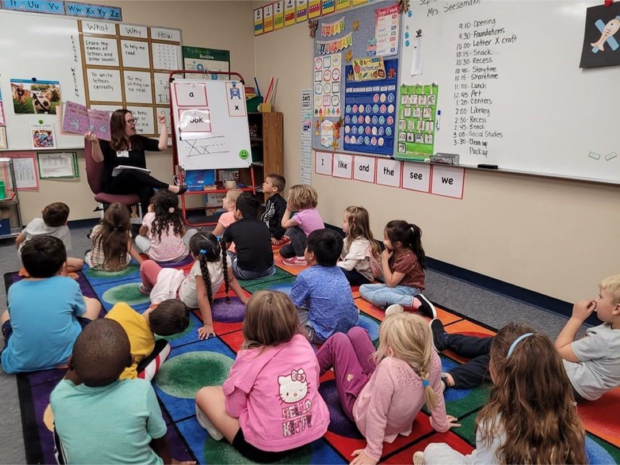The state’s two largest districts earned the best K-3 literacy scores this fall by increasing staffing and adjusting schedules to prioritize instructional time.
Districts and charters have the flexibility to decide how to spend money allocated by the Legislature for early literacy intervention. Over the past seven years, the state sent approximately $186.4 million dollars to schools.
West Ada and Boise districts made similar spending decisions, which produced the highest performing traditional elementary schools.
Based on Idaho Reading Indicator (IRI) results, six of the top 10 highest performers came from Boise elementary schools, and the other four of the top 10 came from West Ada. Nearly 90,000 Idaho students in grades K-3 took the exam in the fall.
Highest Performers: Traditional Schools
| Traditional School | % of students reading at grade level |
| Highlands Elementary (Boise) | 87.8 |
| Collister Elementary (Boise) | 85.4 |
| Cecil D. Andrus Elementary (West Ada) | 83.3 |
| Paramount Elementary (West Ada) | 83 |
| Galileo Magnet (West Ada) | 83 |
| Pioneer School of the Arts (West Ada) | 82.6 |
| Longfellow Elementary (Boise) | 82.2 |
| Adams Elementary (Boise) | 81.8 |
| Trail Wind Elementary (Boise) | 81.2 |
| Washington Elementary (Boise) | 80.9 |
A Focus on intervention
In every elementary, junior high and high school, Boise utilizes learning coaches whose main job is “to come alongside teachers for co-planning, looking at data, and an extra person to brainstorm with,” said Faith Reader, Boise’s language arts supervisor.
Described as Boise’s district-level instructional support team, four reading specialists, three learning coaches and content supervisors “are consistently pushing themselves into buildings to be thinking partners or collaborators with our teachers,” Reader explained.
At least 72% of Boise’s teachers have master’s degrees. “So they are well-educated,” added Dan Hollar, district spokesperson.
West Ada points to similar staffing decisions. Kelly Davies, administrator of assessment and accountability in West Ada, said a portion of the literacy money paid for “reading interventionists” in every building who work with teachers supporting students reading near or below grade level.
“We have monthly collaborations with our literacy coach so that we’re all looking at things through the same lens and responding to student needs as they arise,” Kelly said.
Increased instructional time
West Ada stressed the positive impact of full-day kindergarten on literacy scores.
“So not only are you increasing instructional time, but we’re increasing opportunities for enrichment intervention for kids across the board … Our results are showing evidence of an impact of that increased instructional time,” said Marcus Myers, chief academic officer.
West Ada was one of the first to embrace the governor’s early literacy priority in the learning space of K-3, said Greg Wilson, the district’s communications officer.
“And so I think you’re starting to see that play out when you look at our scores,” said Wilson, who has resigned from West Ada to serve as state superintendent-elect Debbie Critchfield’s chief of staff next year.
Like West Ada, Boise offers all-day kindergarten at every elementary school. Idaho funds only half-day kindergarten so if districts or charters want to offer more instructional time for early learners, they have to direct the money and space to all-day offerings.

Both districts handle intervention similarly by extending instructional time outside of core English language arts (ELA).
At Boise schools, grade-level literacy instruction occurs in a 60-minute block. There’s an additional 30 minutes set aside for intervention or extension.
At West Ada, every K-3 student receives 90 minutes of ELA instruction daily. Intervention occurs outside of core instruction in small groups of three to six students or with one-on-one assistance.
Marcus said, “When you think of intervention, it’s time built in a student’s schedule outside of that 90 minutes.”
Progress is monitored monthly to ensure students are trending in the right direction. “And if it’s not that way, then we intervene very quickly,” Wilson added.
The Legislature is likely to take up the topic of funding early literacy programs during the 2023 session that starts in January. EdNews will closely follow the legislative discussions and debates.
